Ukraine's frontline farmers toil on amid explosions
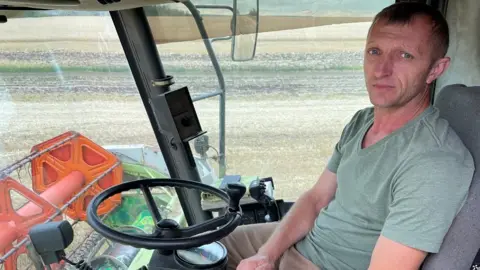 BBC
BBCA boom, like distant thunder, rolled over the wheat fields due west of Slovyansk - a Ukrainian city now being targeted daily by Russian rockets and artillery.
Perched on his seat in a combine harvester, Vladimir Bukhantsev, 47, could see clouds of smoke from missiles hitting an industrial area, then another, thinner plume, from Russian positions on the frontline, perhaps 15km (nine miles) due north.
"It's noisy here. But life goes on. We had a spot of rain earlier, so we've been waiting for the wheat to dry. My son is serving in the army near here. I'm hoping our lads are going to start counter-attacking soon and push the Russians back," he said, on a brief break from work.
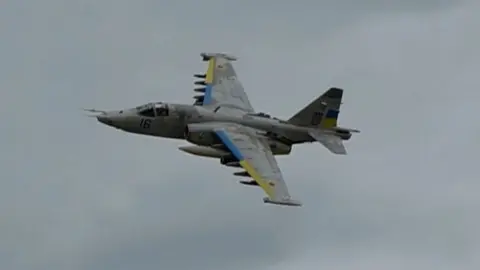
Suddenly there was a shrieking roar as two Ukrainian fighter jets flew low, perhaps 25m (80ft) above the field, directly overhead.
Within seconds the jets were over Russian positions, and Bukhantsev watched the bright tail of a Russian rocket soaring up towards one aircraft, narrowly missing it. Both Sukhoi jets then released decoy flares, turned sharply and headed back south, again passing directly overhead with another deafening roar.
"They fly like that almost every day. It gets lively here. The pilots do their job. We do ours. Everyone is busy. But their work is harder," he said.
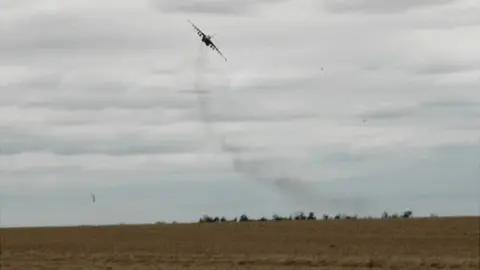
The woods and narrow country lanes around Slovyansk are busy with Ukrainian troops, digging trenches and setting up artillery positions. There are reports that new Western weapons, including Himars rocket systems, are being used locally at night, to fire on ammunition stores and positions deep inside Russian-held territory.
But Ukraine's frontline farmers remain focused on their own battle - to bring in the harvest, despite the constant danger posed by the conflict, and despite plummeting grain prices caused by Russia's blockade of Ukraine's Black Sea ports.
Most of the farmers have already sent their families to safety, further west. In Slovyansk, buses organised by local volunteers and the city administration continue to evacuate dozens of civilians daily.
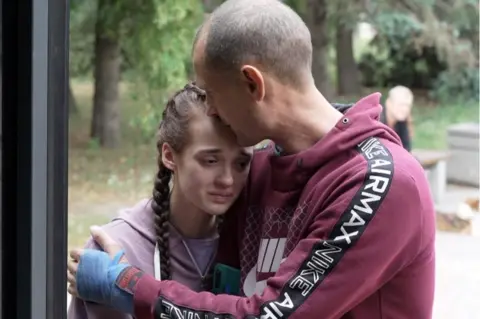
At 09:00 on Thursday, 30 people, many in tears, boarded one bus, along with their pets and a small amount of luggage, as the boom of incoming and outgoing rocket fire echoed around the largely empty streets.
Later the same day, Sergei Kurinniy, owner of the KramAgroSvit farm near the village of Dmytrivka, clambered down the side of a crater, perhaps 4m deep, left by a huge Russian rocket.
"The Russians talk about high-precision targeting. So much for that. This one could easily have hit our village," said the 58-year-old.
Kurinniy's farm, spread over two picturesque, rolling valleys, has more than 3,400 hectares (8,400 acres) of wheat and sunflower seeds, and cattle too. But he closed the livestock business down after rockets hit a cattle shed, killing more than 20 animals. Another rocket missed the farm offices by a few metres, shattering windows.
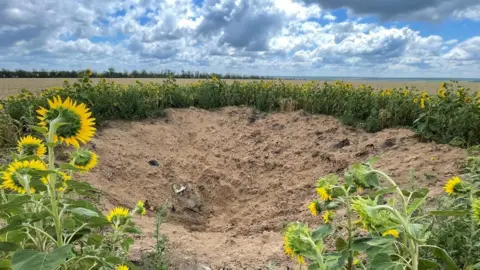
"It's very dangerous, of course. But we're continuing. Our major concern is that the price we receive for our products is lower than usual. Last year, we sold wheat for about $300 (£250) a tonne. Now it's $100. And the cost of fuel has risen threefold.
"Then you have to add in fertilisers, seeds, pesticides, taxes, wages. So this year, we're likely to make no profits. And at any moment, we can be bombarded and everything will burn," he said, flicking through videos on his mobile phone that showed one of his fields on fire after a recent missile strike.
His neighbour lost up to 2,000 hectares of corn to another fire.
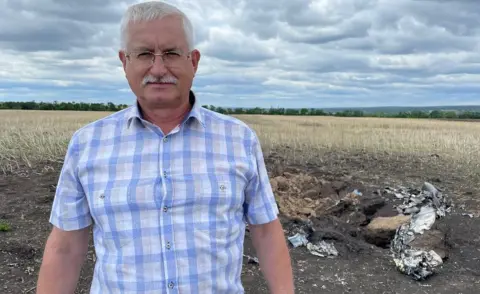
Kurinniy was bitterly critical of President Vladimir Putin and his blockade of Ukrainian ports.
"We usually export 90% of our crops. We need this blockade to be lifted. But not at any price. There should be normal, civilised business relations. Not business combined with the use of threats and violence - as often happens with Russia. It should not be like that in the modern world," he said, angrily accusing Mr Putin of turning Russians into "zombies".
The harvest in Donetsk province this year is expected to be less than half the size of last year's, because of the war, the occupation of territory by Russian troops, and some weather-related issues.
"Our plan is to put a lot of the grain in storage, so we can export it to other countries at a future date. So, our aim now is to bring in the harvest and transfer it to safer parts of Ukraine," said Artem Chahan, the director of agricultural development for Donetsk.
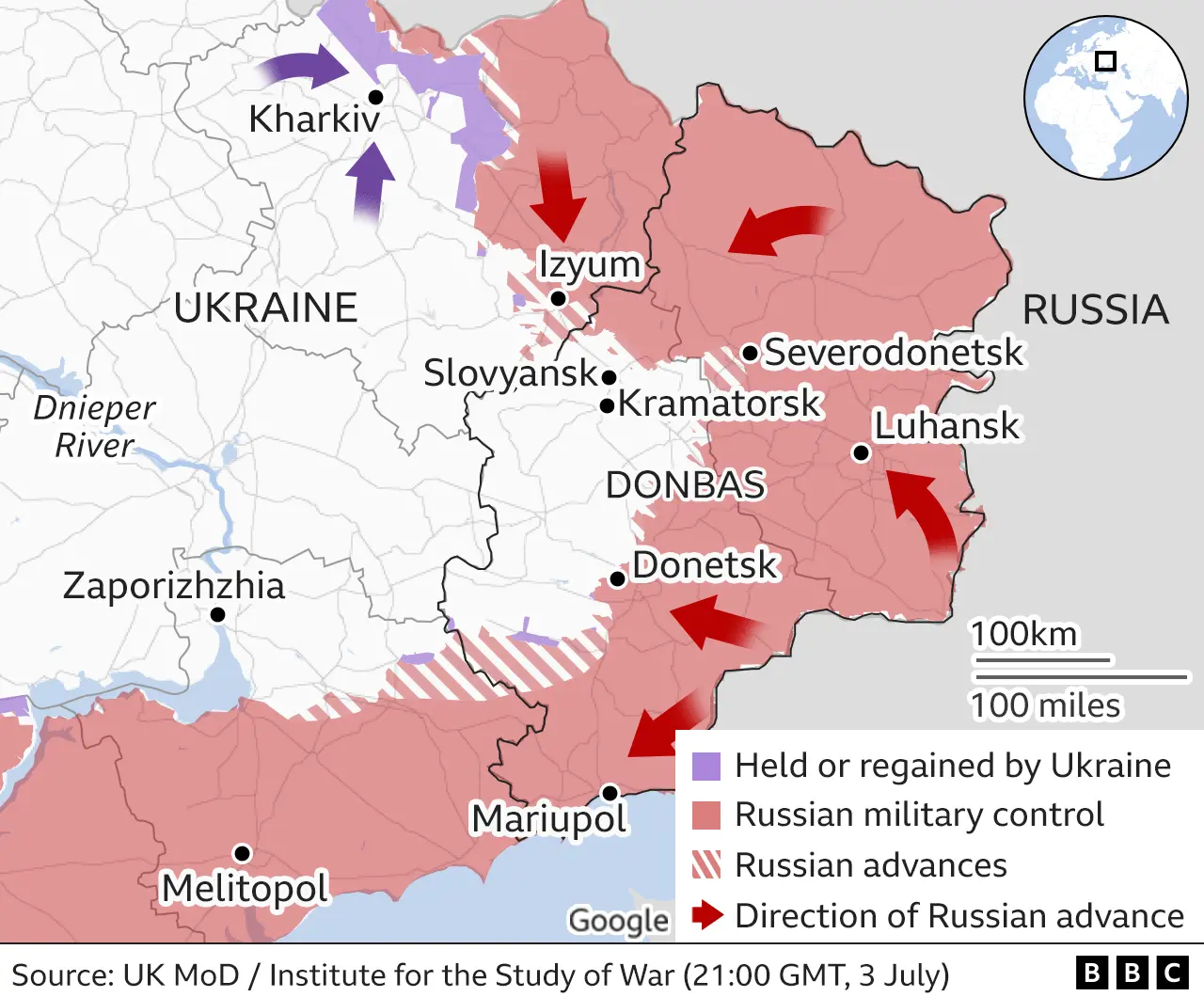

War in Ukraine: More coverage

